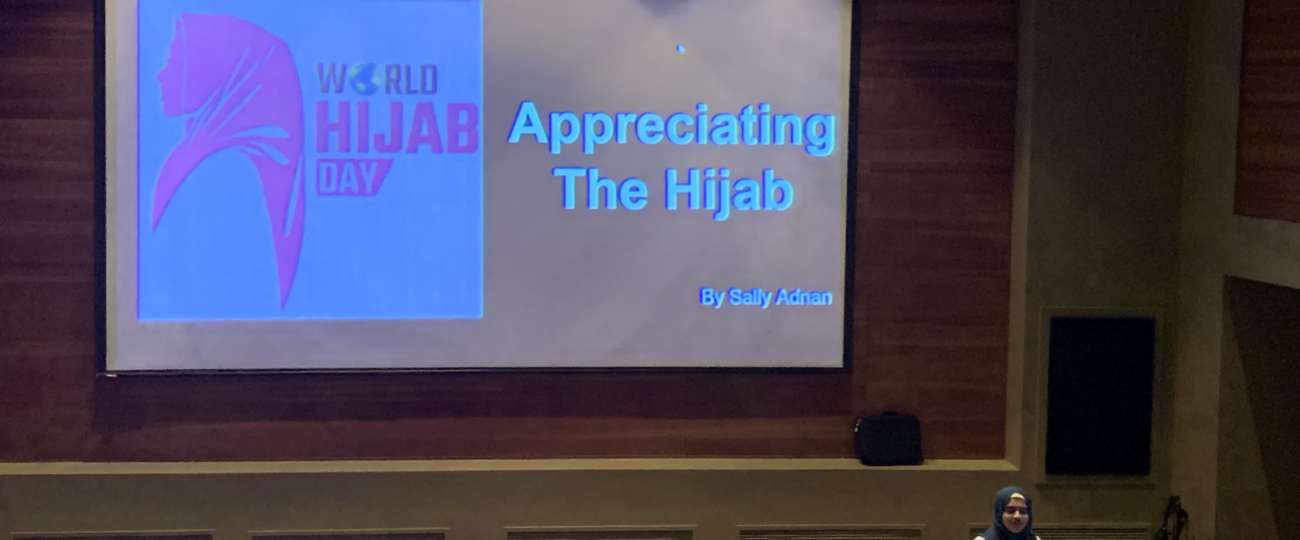What do you know about observing the hijab? Ask yourself the same questions and find out what Sally Adnan says is the truth about being a hijabi.
“Who does the hijab apply to in Islam?,” “Is the hijab a new concept?,” “Is it fair that France bans the practice of hijab in the Olympics?.”
These were the questions asked of the audience during DSU’s cultural event regarding World Hijab Day on Feb. 1, 2023.
Answers from the audience varied depending on each question.
Beginning her talk with these questions, speaker Sally Adnan answered each question with what was a misconception and what was the truth about observing hijab.
Adnan, a hijabi observing Muslim American, has gone from believing that the hijab is unnecessary and not observing to discovering that it is a divine law that unites all across the world.
Growing up as a Muslim American, Adnan struggled with what it meant to be a Muslim woman and how it fit in society.
It wasn’t until 2011 that Adnan said, “it all clicked” when she was reading a passage from the Quran.
The verse said, “Verify we did raise a messenger among every people (or community of people) with the message ‘Worship Allah and stay away from the Rebel (the Satan)’” (The Quran Ch. 16, Verse 36).
“It shows the oneness of God and the one message that is always revealed,” Adnan says.
From there, Adnan researched how the hijab appears in other various religions. Only through history did she understand everything.
Some of these religions she compared included: Christianity, Judaism, Hinduism and Buddhism, and how each Holy scripture for each religion has stated the presence of the hijab.
“We believe God obligated everyone since the beginning of time. Other scriptures have been changed but the Quran stays the same. Continue to keep this divine law alive.”
Adnan states that the hijab is more than just clothing and should be addressed as such.
“It’s [Hijab] not wearing, it’s observing and more than just clothing.”
According to Adnan, by observing the hijab, it is a reminder that you are a Muslim since it sometimes is hard to remember, especially in college.
Although the misconception is that only women observe, both men and women have their own guidelines that each observes the two components of hijab.
The first component is modest behavior, while the second is clothing.
“The behavior part is overlooked many times and is important, possibly more important, than clothing,” Adnan says.
Despite believing that wearing a hijab is divine law, Adnan states that many Muslim women face challenges toward their religion.
In France, girls cannot wear their hijab in school. Meanwhile, in India, protests are going on about whether girls should be allowed to wear them. Adnan even faced losing her job if she didn’t remove the hijab.
Several bans have taken place in Europe and often regard the ban of all religious symbols. But for Muslims, the hijab is more than just a symbol.
“Is it okay to strip someone’s divine belief? Tell them ‘no’ to not observe it. Is that okay?” Adnan asked. “Ask yourself if that is okay if it is a part of my identity and I believe that it is an obligation sent to me from my God.”
To Adnan, wearing the hijab means dignity and honor. It represents her identity as a Muslim.
She wants everyone “to hear more success stories and leave these nightmares of organizations and unions trying to get rid of what we believe has been there since the beginning of time.”
Success stories such as Stephanie Kurlow, the first professional hijabi ballerina and Ilhan Omar, a US Representative.
“Look up these women and they will explain why they have worn these hijabs,” Adnan says.
According to Adnan, the belief that wearing hijabs is oppressive for women “is unfortunate and not true at all.”
She also encourages people to learn more about Muslim culture by reading about hijabs and Islam in general.
For Winthrop student Juman Nouh, senior, the cultural event was very important.
“I really enjoyed it, especially because I’m a Muslim and it just made me really happy to see that something like that has been talked about and just has been explaining those things to different people. Diversify that the hijab is like a cultural thing. It was such an amazing event,”Nouh says.
Kylie Levosky, senior, agrees with Nouh’s words.
“I think that this was really great for Winthrop to have. As a speaker, I think that the benefit of having the history of the hijab and Islam is really important in furthering people’s understanding that the hijab is really empowering for Muslims, and Muslim women, fighting the misconception that the hijab is an oppressive thing. So I think it is just furthering awareness and education about the hijab.”




